Academic and Professional Integrity, Research & Referencing Assignment
VerifiedAdded on 2023/01/19
|7
|1583
|62
Homework Assignment
AI Summary
This assignment explores the student's understanding of academic and professional integrity, as well as research and referencing skills within the context of business communication. The student defines academic integrity as avoiding plagiarism and giving proper credit, while professional integrity is defined as adhering to ethical codes within a profession. The assignment discusses the importance of academic integrity, including trustworthiness, value to a degree, and peace of mind. It contrasts previous and current understandings of both academic and professional integrity, referencing relevant frameworks and definitions. The student applies these concepts to education and industry sectors, emphasizing honesty and ethical behavior. The assignment also includes a detailed discussion of the significance of academic and professional integrity and how to apply them in the workplace.
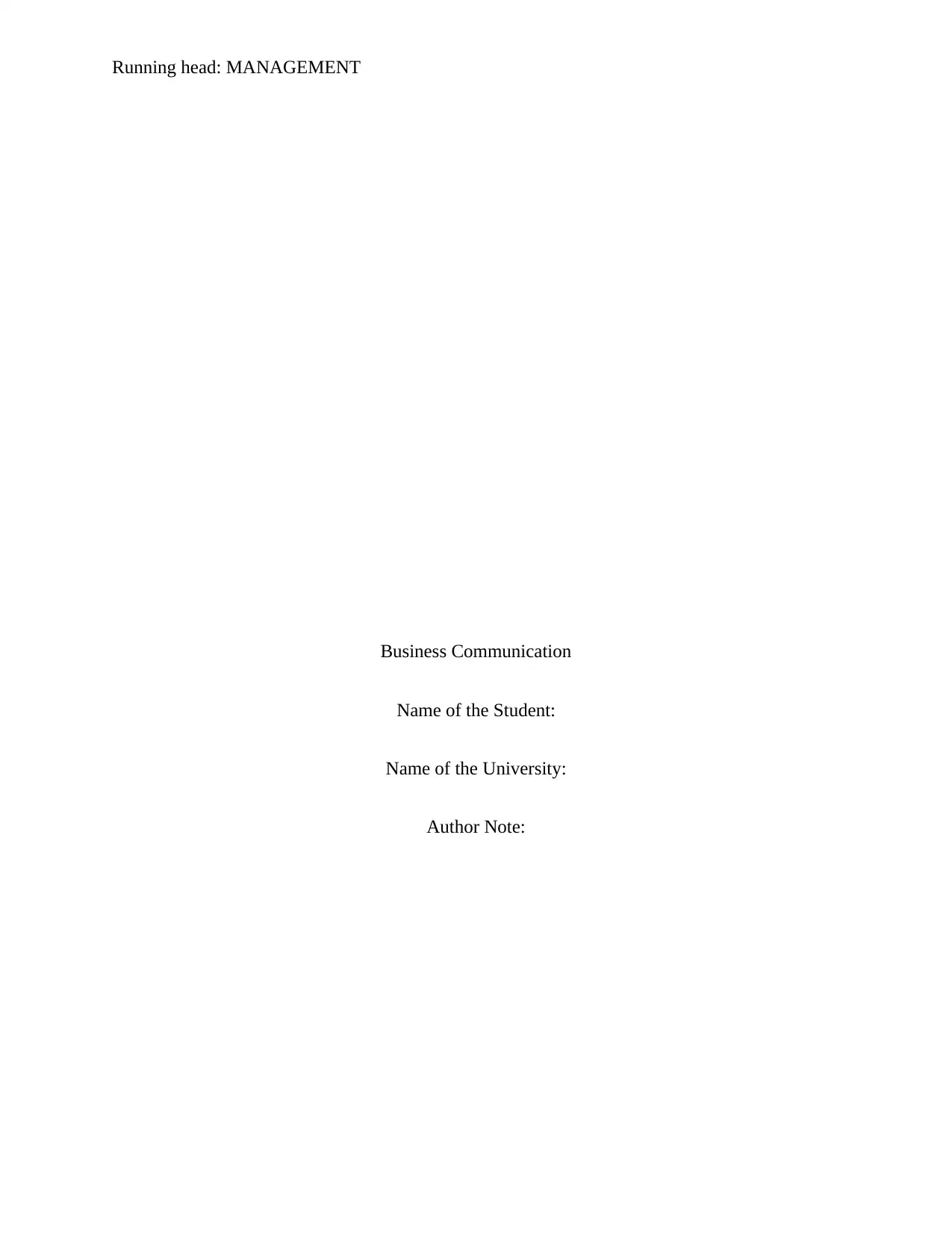
Running head: MANAGEMENT
Business Communication
Name of the Student:
Name of the University:
Author Note:
Business Communication
Name of the Student:
Name of the University:
Author Note:
Paraphrase This Document
Need a fresh take? Get an instant paraphrase of this document with our AI Paraphraser
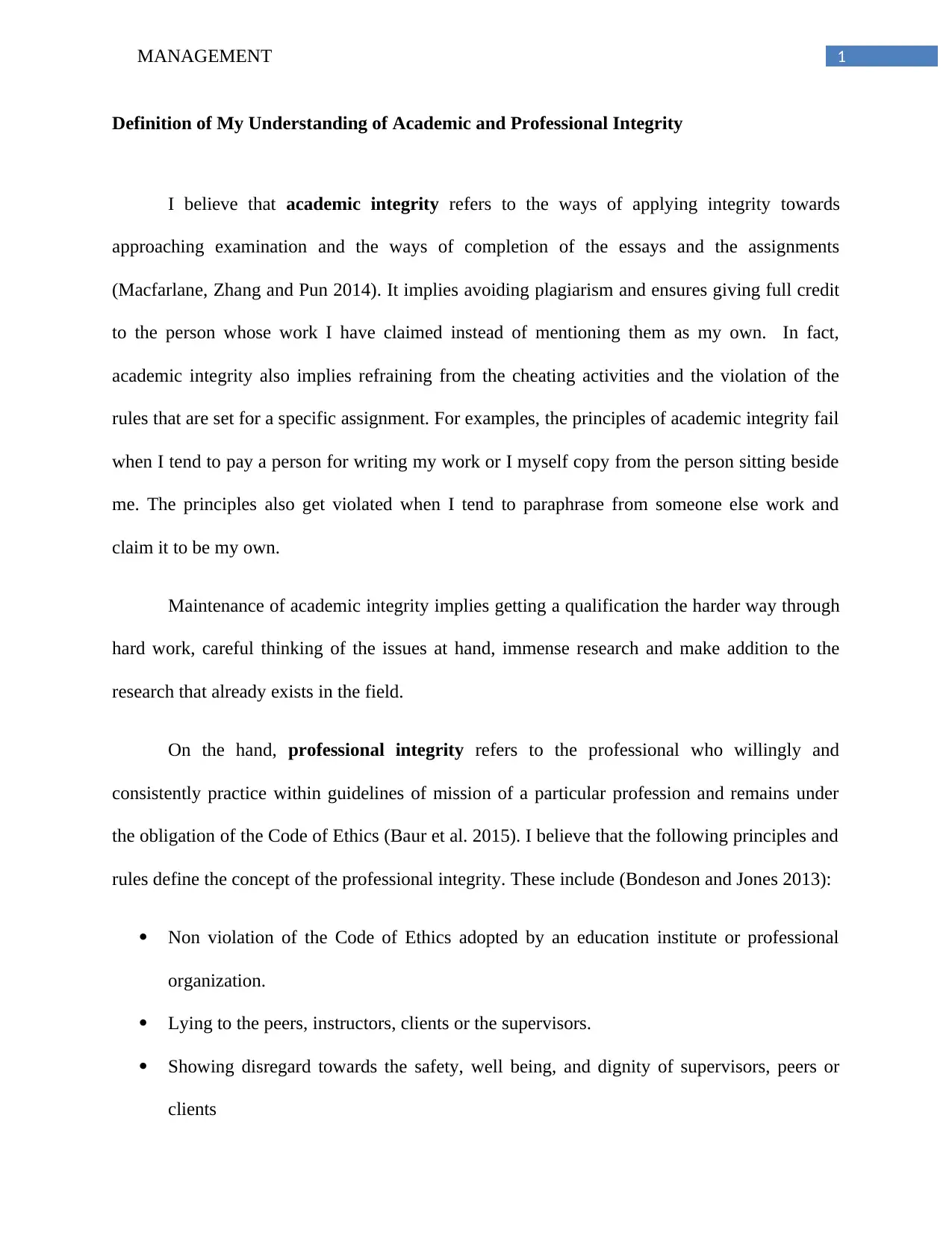
1MANAGEMENT
Definition of My Understanding of Academic and Professional Integrity
I believe that academic integrity refers to the ways of applying integrity towards
approaching examination and the ways of completion of the essays and the assignments
(Macfarlane, Zhang and Pun 2014). It implies avoiding plagiarism and ensures giving full credit
to the person whose work I have claimed instead of mentioning them as my own. In fact,
academic integrity also implies refraining from the cheating activities and the violation of the
rules that are set for a specific assignment. For examples, the principles of academic integrity fail
when I tend to pay a person for writing my work or I myself copy from the person sitting beside
me. The principles also get violated when I tend to paraphrase from someone else work and
claim it to be my own.
Maintenance of academic integrity implies getting a qualification the harder way through
hard work, careful thinking of the issues at hand, immense research and make addition to the
research that already exists in the field.
On the hand, professional integrity refers to the professional who willingly and
consistently practice within guidelines of mission of a particular profession and remains under
the obligation of the Code of Ethics (Baur et al. 2015). I believe that the following principles and
rules define the concept of the professional integrity. These include (Bondeson and Jones 2013):
Non violation of the Code of Ethics adopted by an education institute or professional
organization.
Lying to the peers, instructors, clients or the supervisors.
Showing disregard towards the safety, well being, and dignity of supervisors, peers or
clients
Definition of My Understanding of Academic and Professional Integrity
I believe that academic integrity refers to the ways of applying integrity towards
approaching examination and the ways of completion of the essays and the assignments
(Macfarlane, Zhang and Pun 2014). It implies avoiding plagiarism and ensures giving full credit
to the person whose work I have claimed instead of mentioning them as my own. In fact,
academic integrity also implies refraining from the cheating activities and the violation of the
rules that are set for a specific assignment. For examples, the principles of academic integrity fail
when I tend to pay a person for writing my work or I myself copy from the person sitting beside
me. The principles also get violated when I tend to paraphrase from someone else work and
claim it to be my own.
Maintenance of academic integrity implies getting a qualification the harder way through
hard work, careful thinking of the issues at hand, immense research and make addition to the
research that already exists in the field.
On the hand, professional integrity refers to the professional who willingly and
consistently practice within guidelines of mission of a particular profession and remains under
the obligation of the Code of Ethics (Baur et al. 2015). I believe that the following principles and
rules define the concept of the professional integrity. These include (Bondeson and Jones 2013):
Non violation of the Code of Ethics adopted by an education institute or professional
organization.
Lying to the peers, instructors, clients or the supervisors.
Showing disregard towards the safety, well being, and dignity of supervisors, peers or
clients
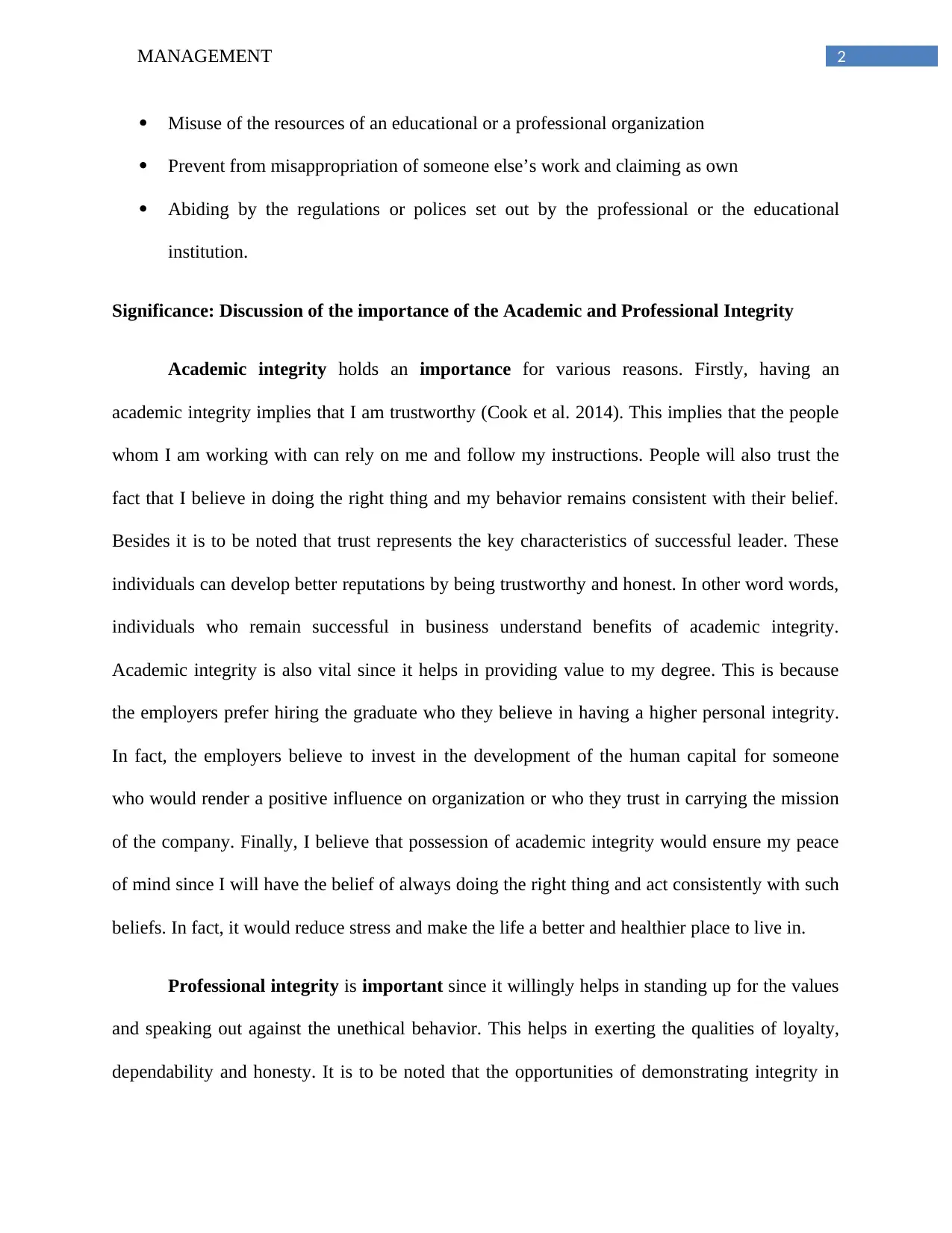
2MANAGEMENT
Misuse of the resources of an educational or a professional organization
Prevent from misappropriation of someone else’s work and claiming as own
Abiding by the regulations or polices set out by the professional or the educational
institution.
Significance: Discussion of the importance of the Academic and Professional Integrity
Academic integrity holds an importance for various reasons. Firstly, having an
academic integrity implies that I am trustworthy (Cook et al. 2014). This implies that the people
whom I am working with can rely on me and follow my instructions. People will also trust the
fact that I believe in doing the right thing and my behavior remains consistent with their belief.
Besides it is to be noted that trust represents the key characteristics of successful leader. These
individuals can develop better reputations by being trustworthy and honest. In other word words,
individuals who remain successful in business understand benefits of academic integrity.
Academic integrity is also vital since it helps in providing value to my degree. This is because
the employers prefer hiring the graduate who they believe in having a higher personal integrity.
In fact, the employers believe to invest in the development of the human capital for someone
who would render a positive influence on organization or who they trust in carrying the mission
of the company. Finally, I believe that possession of academic integrity would ensure my peace
of mind since I will have the belief of always doing the right thing and act consistently with such
beliefs. In fact, it would reduce stress and make the life a better and healthier place to live in.
Professional integrity is important since it willingly helps in standing up for the values
and speaking out against the unethical behavior. This helps in exerting the qualities of loyalty,
dependability and honesty. It is to be noted that the opportunities of demonstrating integrity in
Misuse of the resources of an educational or a professional organization
Prevent from misappropriation of someone else’s work and claiming as own
Abiding by the regulations or polices set out by the professional or the educational
institution.
Significance: Discussion of the importance of the Academic and Professional Integrity
Academic integrity holds an importance for various reasons. Firstly, having an
academic integrity implies that I am trustworthy (Cook et al. 2014). This implies that the people
whom I am working with can rely on me and follow my instructions. People will also trust the
fact that I believe in doing the right thing and my behavior remains consistent with their belief.
Besides it is to be noted that trust represents the key characteristics of successful leader. These
individuals can develop better reputations by being trustworthy and honest. In other word words,
individuals who remain successful in business understand benefits of academic integrity.
Academic integrity is also vital since it helps in providing value to my degree. This is because
the employers prefer hiring the graduate who they believe in having a higher personal integrity.
In fact, the employers believe to invest in the development of the human capital for someone
who would render a positive influence on organization or who they trust in carrying the mission
of the company. Finally, I believe that possession of academic integrity would ensure my peace
of mind since I will have the belief of always doing the right thing and act consistently with such
beliefs. In fact, it would reduce stress and make the life a better and healthier place to live in.
Professional integrity is important since it willingly helps in standing up for the values
and speaking out against the unethical behavior. This helps in exerting the qualities of loyalty,
dependability and honesty. It is to be noted that the opportunities of demonstrating integrity in
⊘ This is a preview!⊘
Do you want full access?
Subscribe today to unlock all pages.

Trusted by 1+ million students worldwide
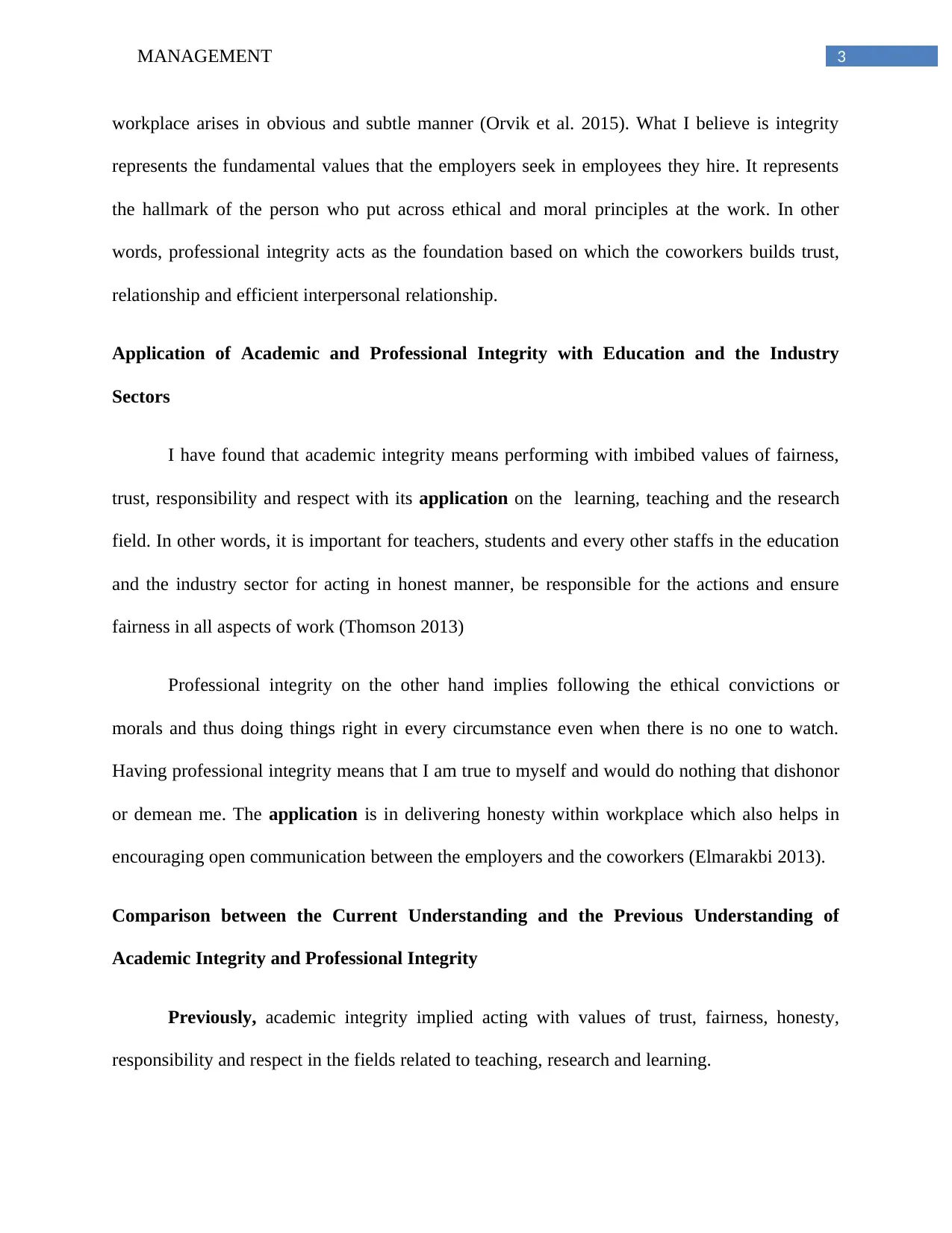
3MANAGEMENT
workplace arises in obvious and subtle manner (Orvik et al. 2015). What I believe is integrity
represents the fundamental values that the employers seek in employees they hire. It represents
the hallmark of the person who put across ethical and moral principles at the work. In other
words, professional integrity acts as the foundation based on which the coworkers builds trust,
relationship and efficient interpersonal relationship.
Application of Academic and Professional Integrity with Education and the Industry
Sectors
I have found that academic integrity means performing with imbibed values of fairness,
trust, responsibility and respect with its application on the learning, teaching and the research
field. In other words, it is important for teachers, students and every other staffs in the education
and the industry sector for acting in honest manner, be responsible for the actions and ensure
fairness in all aspects of work (Thomson 2013)
Professional integrity on the other hand implies following the ethical convictions or
morals and thus doing things right in every circumstance even when there is no one to watch.
Having professional integrity means that I am true to myself and would do nothing that dishonor
or demean me. The application is in delivering honesty within workplace which also helps in
encouraging open communication between the employers and the coworkers (Elmarakbi 2013).
Comparison between the Current Understanding and the Previous Understanding of
Academic Integrity and Professional Integrity
Previously, academic integrity implied acting with values of trust, fairness, honesty,
responsibility and respect in the fields related to teaching, research and learning.
workplace arises in obvious and subtle manner (Orvik et al. 2015). What I believe is integrity
represents the fundamental values that the employers seek in employees they hire. It represents
the hallmark of the person who put across ethical and moral principles at the work. In other
words, professional integrity acts as the foundation based on which the coworkers builds trust,
relationship and efficient interpersonal relationship.
Application of Academic and Professional Integrity with Education and the Industry
Sectors
I have found that academic integrity means performing with imbibed values of fairness,
trust, responsibility and respect with its application on the learning, teaching and the research
field. In other words, it is important for teachers, students and every other staffs in the education
and the industry sector for acting in honest manner, be responsible for the actions and ensure
fairness in all aspects of work (Thomson 2013)
Professional integrity on the other hand implies following the ethical convictions or
morals and thus doing things right in every circumstance even when there is no one to watch.
Having professional integrity means that I am true to myself and would do nothing that dishonor
or demean me. The application is in delivering honesty within workplace which also helps in
encouraging open communication between the employers and the coworkers (Elmarakbi 2013).
Comparison between the Current Understanding and the Previous Understanding of
Academic Integrity and Professional Integrity
Previously, academic integrity implied acting with values of trust, fairness, honesty,
responsibility and respect in the fields related to teaching, research and learning.
Paraphrase This Document
Need a fresh take? Get an instant paraphrase of this document with our AI Paraphraser
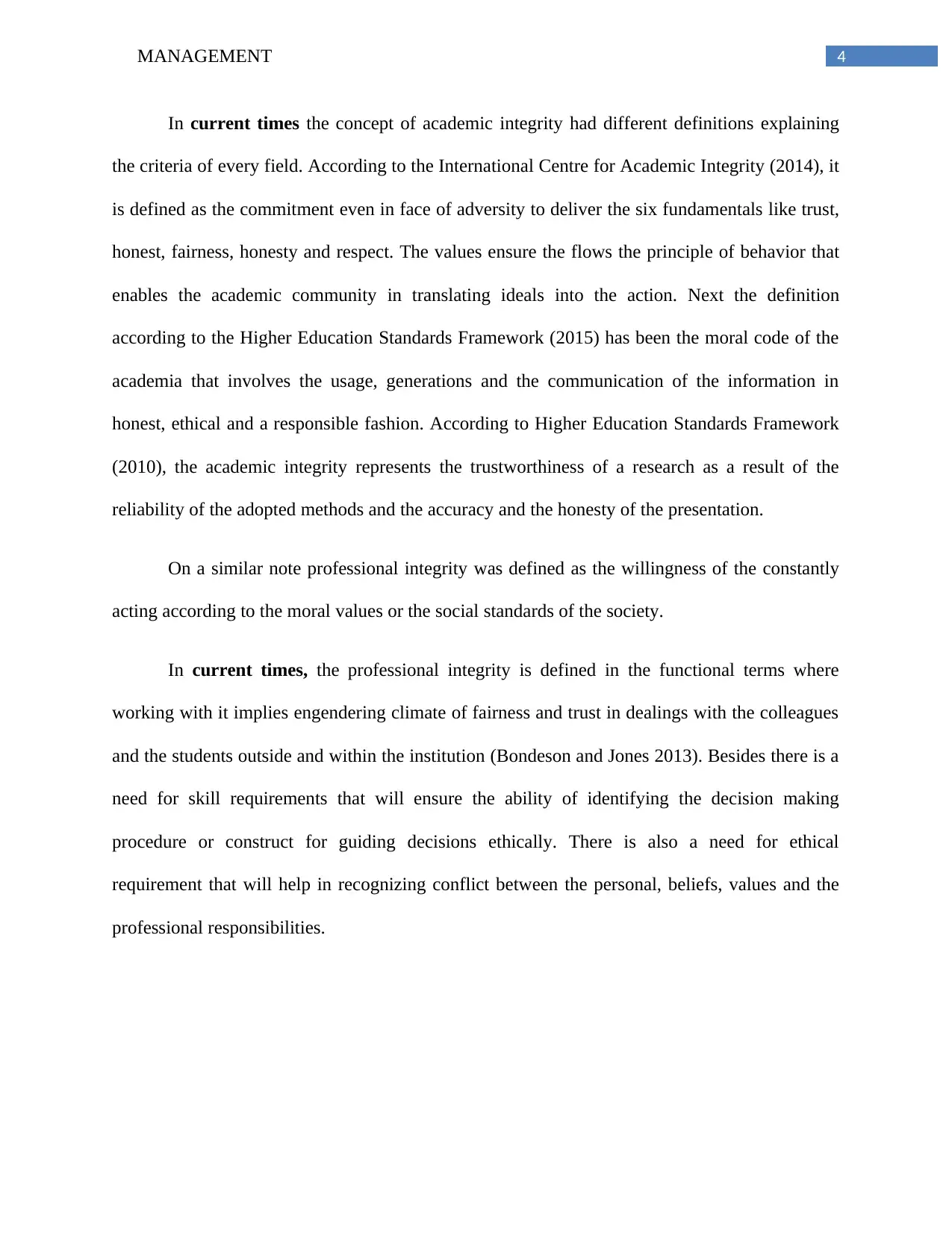
4MANAGEMENT
In current times the concept of academic integrity had different definitions explaining
the criteria of every field. According to the International Centre for Academic Integrity (2014), it
is defined as the commitment even in face of adversity to deliver the six fundamentals like trust,
honest, fairness, honesty and respect. The values ensure the flows the principle of behavior that
enables the academic community in translating ideals into the action. Next the definition
according to the Higher Education Standards Framework (2015) has been the moral code of the
academia that involves the usage, generations and the communication of the information in
honest, ethical and a responsible fashion. According to Higher Education Standards Framework
(2010), the academic integrity represents the trustworthiness of a research as a result of the
reliability of the adopted methods and the accuracy and the honesty of the presentation.
On a similar note professional integrity was defined as the willingness of the constantly
acting according to the moral values or the social standards of the society.
In current times, the professional integrity is defined in the functional terms where
working with it implies engendering climate of fairness and trust in dealings with the colleagues
and the students outside and within the institution (Bondeson and Jones 2013). Besides there is a
need for skill requirements that will ensure the ability of identifying the decision making
procedure or construct for guiding decisions ethically. There is also a need for ethical
requirement that will help in recognizing conflict between the personal, beliefs, values and the
professional responsibilities.
In current times the concept of academic integrity had different definitions explaining
the criteria of every field. According to the International Centre for Academic Integrity (2014), it
is defined as the commitment even in face of adversity to deliver the six fundamentals like trust,
honest, fairness, honesty and respect. The values ensure the flows the principle of behavior that
enables the academic community in translating ideals into the action. Next the definition
according to the Higher Education Standards Framework (2015) has been the moral code of the
academia that involves the usage, generations and the communication of the information in
honest, ethical and a responsible fashion. According to Higher Education Standards Framework
(2010), the academic integrity represents the trustworthiness of a research as a result of the
reliability of the adopted methods and the accuracy and the honesty of the presentation.
On a similar note professional integrity was defined as the willingness of the constantly
acting according to the moral values or the social standards of the society.
In current times, the professional integrity is defined in the functional terms where
working with it implies engendering climate of fairness and trust in dealings with the colleagues
and the students outside and within the institution (Bondeson and Jones 2013). Besides there is a
need for skill requirements that will ensure the ability of identifying the decision making
procedure or construct for guiding decisions ethically. There is also a need for ethical
requirement that will help in recognizing conflict between the personal, beliefs, values and the
professional responsibilities.
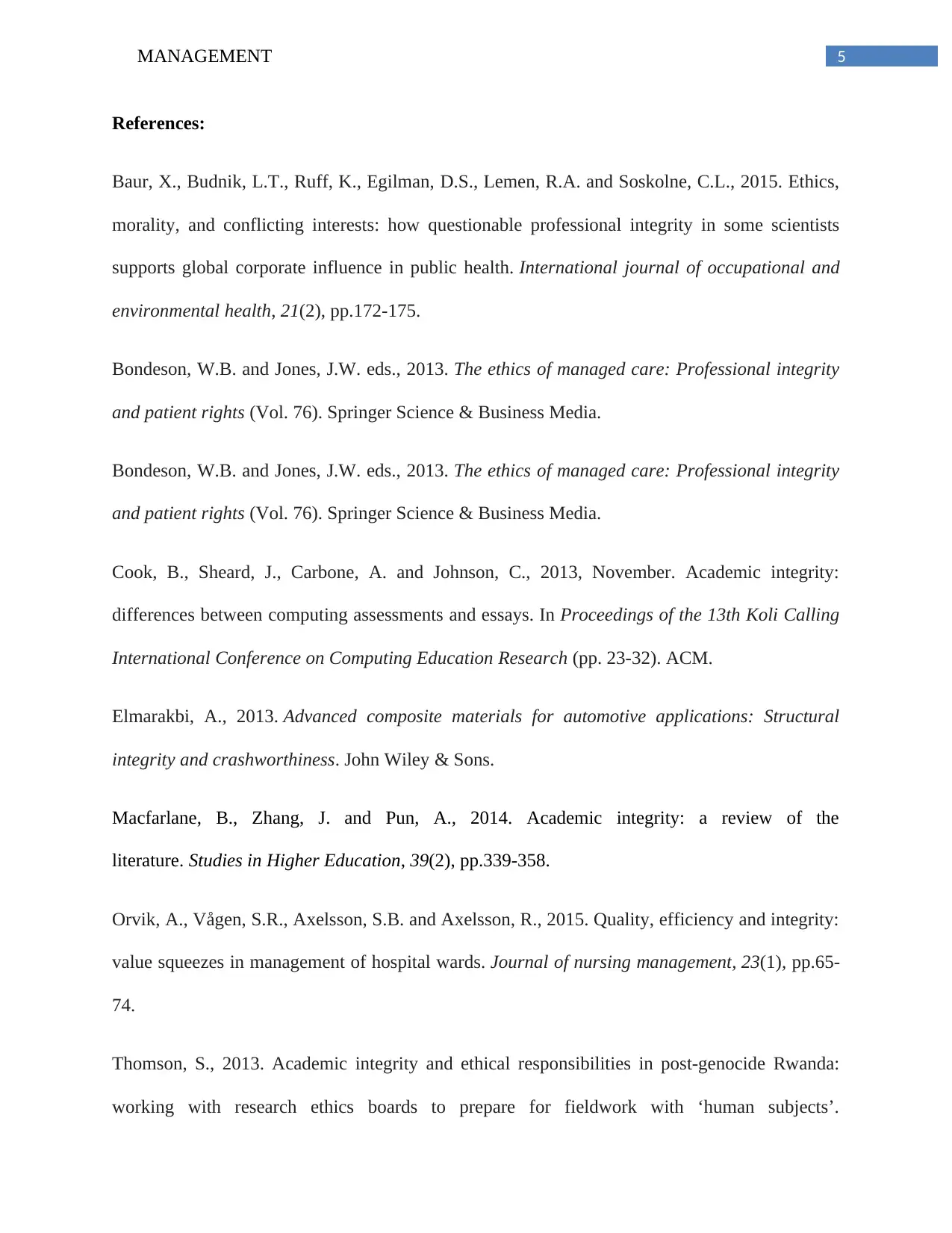
5MANAGEMENT
References:
Baur, X., Budnik, L.T., Ruff, K., Egilman, D.S., Lemen, R.A. and Soskolne, C.L., 2015. Ethics,
morality, and conflicting interests: how questionable professional integrity in some scientists
supports global corporate influence in public health. International journal of occupational and
environmental health, 21(2), pp.172-175.
Bondeson, W.B. and Jones, J.W. eds., 2013. The ethics of managed care: Professional integrity
and patient rights (Vol. 76). Springer Science & Business Media.
Bondeson, W.B. and Jones, J.W. eds., 2013. The ethics of managed care: Professional integrity
and patient rights (Vol. 76). Springer Science & Business Media.
Cook, B., Sheard, J., Carbone, A. and Johnson, C., 2013, November. Academic integrity:
differences between computing assessments and essays. In Proceedings of the 13th Koli Calling
International Conference on Computing Education Research (pp. 23-32). ACM.
Elmarakbi, A., 2013. Advanced composite materials for automotive applications: Structural
integrity and crashworthiness. John Wiley & Sons.
Macfarlane, B., Zhang, J. and Pun, A., 2014. Academic integrity: a review of the
literature. Studies in Higher Education, 39(2), pp.339-358.
Orvik, A., Vågen, S.R., Axelsson, S.B. and Axelsson, R., 2015. Quality, efficiency and integrity:
value squeezes in management of hospital wards. Journal of nursing management, 23(1), pp.65-
74.
Thomson, S., 2013. Academic integrity and ethical responsibilities in post-genocide Rwanda:
working with research ethics boards to prepare for fieldwork with ‘human subjects’.
References:
Baur, X., Budnik, L.T., Ruff, K., Egilman, D.S., Lemen, R.A. and Soskolne, C.L., 2015. Ethics,
morality, and conflicting interests: how questionable professional integrity in some scientists
supports global corporate influence in public health. International journal of occupational and
environmental health, 21(2), pp.172-175.
Bondeson, W.B. and Jones, J.W. eds., 2013. The ethics of managed care: Professional integrity
and patient rights (Vol. 76). Springer Science & Business Media.
Bondeson, W.B. and Jones, J.W. eds., 2013. The ethics of managed care: Professional integrity
and patient rights (Vol. 76). Springer Science & Business Media.
Cook, B., Sheard, J., Carbone, A. and Johnson, C., 2013, November. Academic integrity:
differences between computing assessments and essays. In Proceedings of the 13th Koli Calling
International Conference on Computing Education Research (pp. 23-32). ACM.
Elmarakbi, A., 2013. Advanced composite materials for automotive applications: Structural
integrity and crashworthiness. John Wiley & Sons.
Macfarlane, B., Zhang, J. and Pun, A., 2014. Academic integrity: a review of the
literature. Studies in Higher Education, 39(2), pp.339-358.
Orvik, A., Vågen, S.R., Axelsson, S.B. and Axelsson, R., 2015. Quality, efficiency and integrity:
value squeezes in management of hospital wards. Journal of nursing management, 23(1), pp.65-
74.
Thomson, S., 2013. Academic integrity and ethical responsibilities in post-genocide Rwanda:
working with research ethics boards to prepare for fieldwork with ‘human subjects’.
⊘ This is a preview!⊘
Do you want full access?
Subscribe today to unlock all pages.

Trusted by 1+ million students worldwide
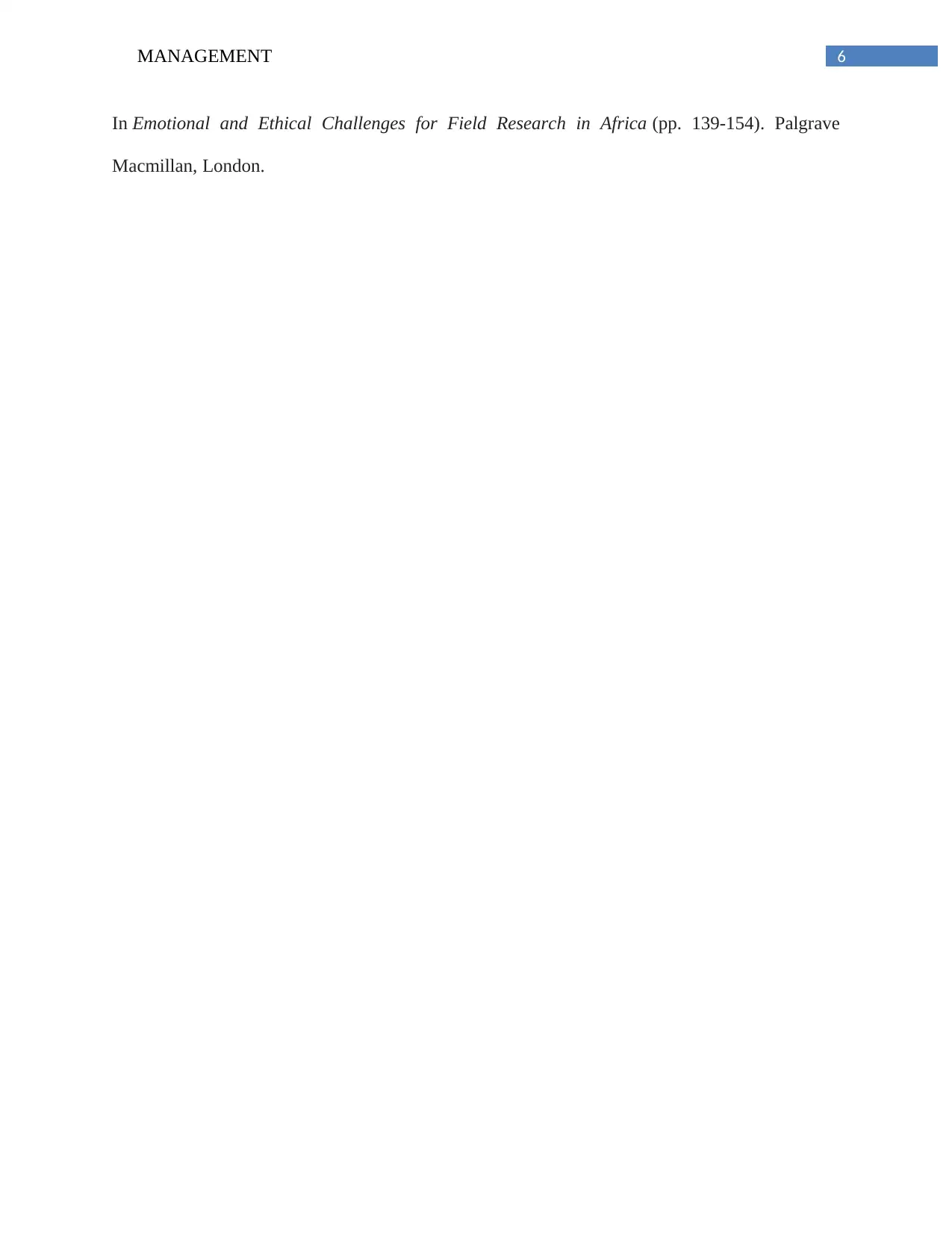
6MANAGEMENT
In Emotional and Ethical Challenges for Field Research in Africa (pp. 139-154). Palgrave
Macmillan, London.
In Emotional and Ethical Challenges for Field Research in Africa (pp. 139-154). Palgrave
Macmillan, London.
1 out of 7
Related Documents
Your All-in-One AI-Powered Toolkit for Academic Success.
+13062052269
info@desklib.com
Available 24*7 on WhatsApp / Email
![[object Object]](/_next/static/media/star-bottom.7253800d.svg)
Unlock your academic potential
Copyright © 2020–2026 A2Z Services. All Rights Reserved. Developed and managed by ZUCOL.





